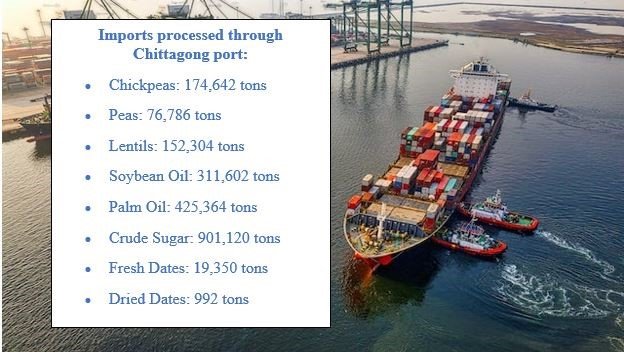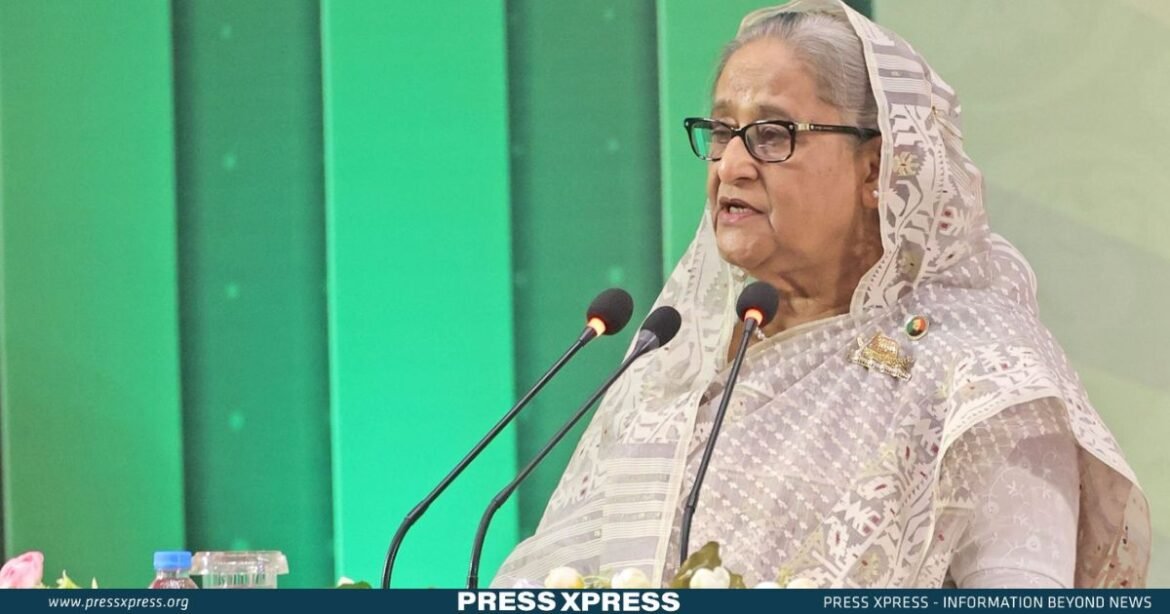Key Highlights:
- Prime Minister Sheikh Hasina has unequivocally stated that there will be no shortage of essential commodities during this sacred month
- Importers estimate that the annual demand for chickpeas ranges from 200,000 to 250,000 tons, with over 70,000 tons specifically during Ramadan
- Chittagong Customs reports reveal that between July 1, 2023, and February 12, 2024, a total of 94,757 tons of chickpeas, 75,643 tons of peas, and 75,643 tons of lentils were processed through Chittagong port for the current fiscal year (2023-24)
- In the span of 43 days, from January 1 to February 12 of the current year, a significant quantity of imported consumer goods was released, including 79,885 tons of chickpeas
With the imminent arrival of Ramadan in Bangladesh, the air is filled with a sense of anticipation for spiritual introspection and communal gatherings. Yet, amid this anticipation, a notable worry arises- the unpredictable fluctuations in commodity prices.
Stepping into this concern with reassurance, Prime Minister Sheikh Hasina has unequivocally stated that there will be no shortage of essential commodities during this sacred month. Speaking at a press conference held on 24 February 2024 at the Gono Bhaban, she reassured the public that all necessary arrangements have already been made to ensure a smooth and abundant supply of goods.
The Prime Minister emphasized that the government has taken proactive steps to address any potential scarcity. She confirmed that arrangements have been made to import sufficient quantities of essential items, including chickpeas, dates, and sugar. These staples are crucial for iftar and sehri meals, and their availability is of utmost importance during Ramadan.
Addressing concerns about price manipulation, the Prime Minister pointed out that certain elements have attempted to artificially inflate prices. She questioned the motives behind such actions, stating, “Don’t you think those who want to overthrow the government have played some tricks in increasing the prices?” The government remains vigilant against any attempts to exploit the situation.
To keep prices in check, the average cost of goods purchased by traders will determine the fixed rates. Additionally, a monitoring cell will oversee retail markets to ensure fair pricing and adequate supply.
Government Plans Stockpile of 6 Vital Items Ahead of Ramadan
Commerce Minister Tipu Munshi has assured traders and importers that the proposal to maintain a steady supply of essential goods will be reviewed. The government aims to stockpile 6 food essentials: edible oil, chickpeas, lentils, onions, sugar, and dates. By doing so, they intend to prevent any supply crunch during Ramadan.

Importers estimate that the annual demand for chickpeas ranges from 200,000 to 250,000 tons, with over 70,000 tons specifically during Ramadan. Australian chickpeas, known for their quality and appearance, are particularly sought after in Bangladesh, although there is also a supply of Indian gram available in the market.
Over the past month, prices of chickpeas have dropped by Tk 150-Tk 200 per mound, with chickpeas now being sold at Tk 34-35 per kg, down from Tk 36 per kg. Despite the decrease, there is still a plentiful stock of chickpeas available. Additionally, the price of onions has seen a decline of Tk 100-150 per mound, with imports coming primarily from Russia and Ukraine.
Abu Taher, a DO businessman in Khatunganj, highlighted the significant trading of palm oil in the edible oil market. On February 17, S Alam Group’s palm oil was available at Tk 4800, City Group’s at Tk 4840, and Meghna Group’s at Tk 4880.
Importers are hopeful that the government’s reduction in duty on sugar and oil could lead to a positive change in the market. The control primarily lies with the millers. As long as they maintain normal supply levels, there should be no market issues during Ramadan.
A Call to Consumers
Prime Minister Sheikh Hasina urged consumers not to hoard groceries for the entire month. By avoiding stockpiling, individuals can contribute to price stability and equitable distribution.
In particular, the government has proactively initiated measures to stabilize consumer goods prices. Bangladesh Bank’s facilitation of 90-day suppliers or buyer’s credit for importing high-demand products during Ramadan has significantly empowered old importers to procure additional goods.

Chittagong Customs reports reveal that between July 1, 2023, and February 12, 2024, a total of 94,757 tons of chickpeas, 75,643 tons of peas, and 75,643 tons of lentils were processed through Chittagong port for the current fiscal year (2023-24).
Moreover, 221,696 tons of soybean oil, 349,761 tons of palm oil, and 901,120 tons of crude sugar were also cleared during this time. Imports included 14,121 tons of fresh dates and 908 tons of dried dates. Additionally, traders in Chittagong have been bringing in chickpeas and lentils from India via the land port.
In the span of 43 days, from January 1 to February 12 of the current year, a significant quantity of imported consumer goods was released, including 79,885 tons of chickpeas, 1,143 tons of peas, 76,661 tons of lentils, 89,906 tons of soybean oil, and 19,403 tons of palm oil. Furthermore, imports also consisted of 139,532 tons of raw sugar, 5,229 tons of fresh dates, and 84 tons of dried dates.
Traders said that product prices have escalated due to the dollar crisis, in contrast to the previous year. Nevertheless, importers are proactively utilizing letters of credit (LCs) facilitated by different government initiatives to maintain the supply chain of consumer goods during Ramadan.
In conclusion, As the sacred month of Ramadan draws near in Bangladesh, Prime Minister Sheikh Hasina’s resolute assurance resonates deeply, promising a bountiful season of spiritual reflection and communal harmony. With proactive measures in place to ensure a steady supply of essential commodities, the government’s steadfast commitment shines through.


